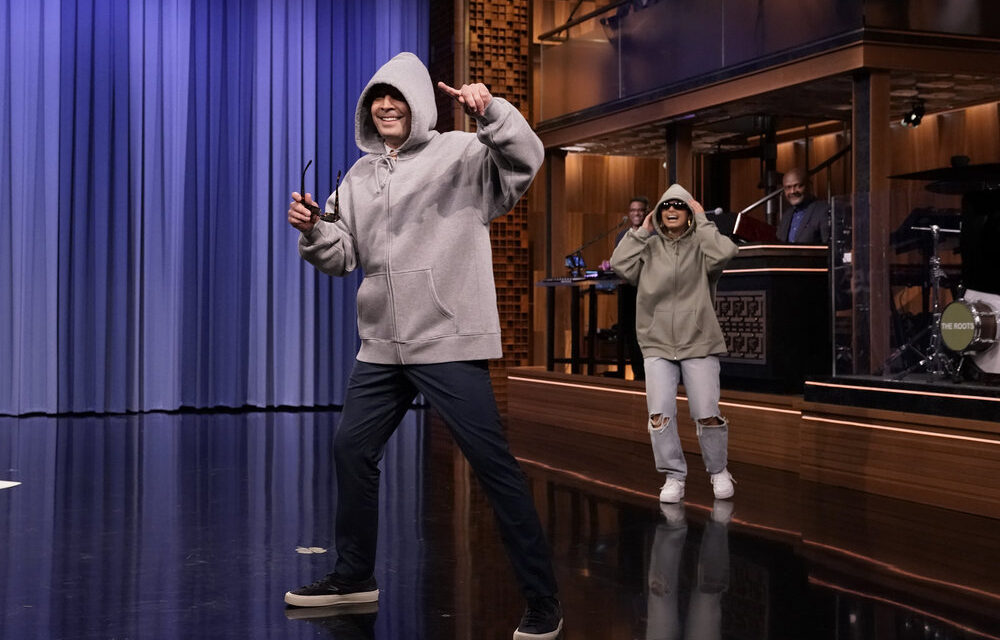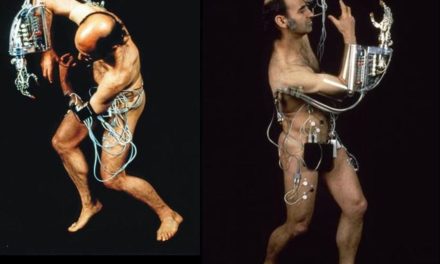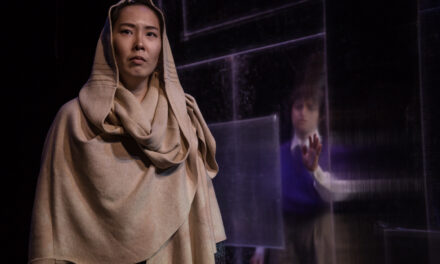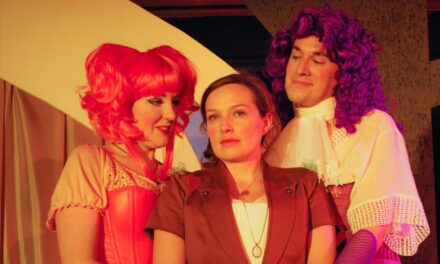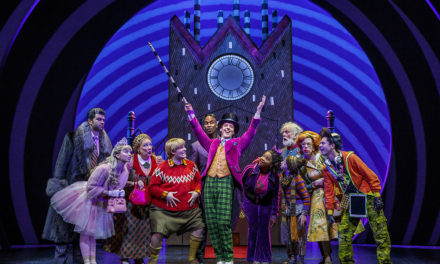On March 26, 2021, ultra-famous TikTok star Addison Rae Easterling appeared on The Tonight Show Starring Jimmy Fallon. During her visit, she performed popular TikTok dance trends during one of the show’s recurring segments in which (white) TikTokers teach Jimmy Fallon trending dances (mostly) created by Black teens on the increasingly popular social media platform. Almost exactly a year before, Charli D’Amelio, TikTok’s most-followed user with over 111 million followers, went on The Tonight Show to teach Fallon another set of dances that trended on TikTok. And, in both cases, credit was not given to the artists who made these songs and the choreographers who made these dances viable pieces of popular culture. As usual, credit was blurred, perhaps leading viewers to believe that “TikTok famous” teens like D’Amelio and Addison Rae created these dances and, as a result, influenced the way that young people today dance. Of course, there is more to this story.
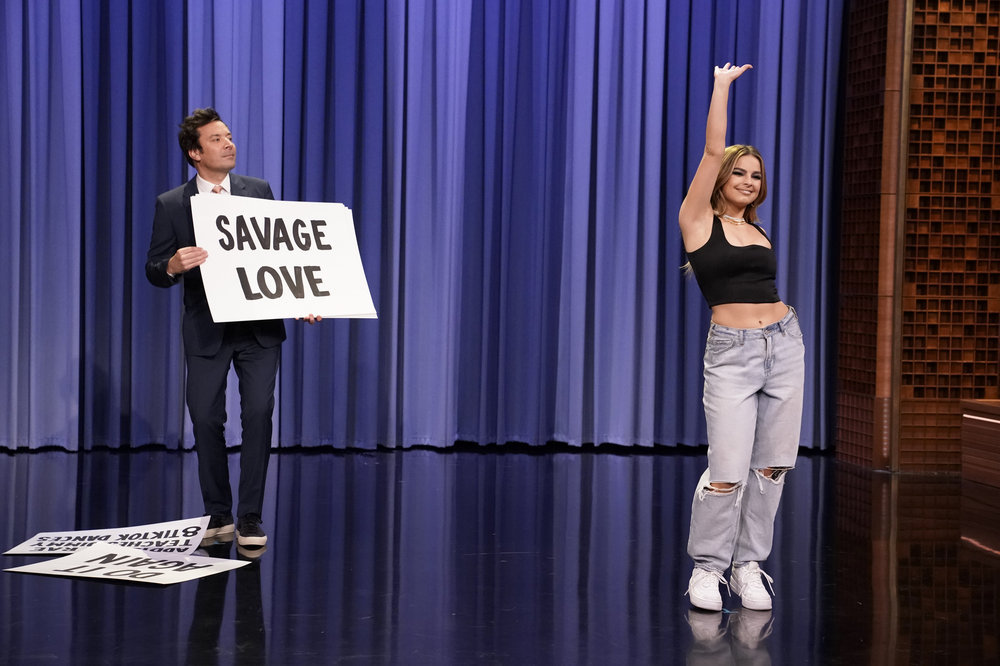
Addison Rae teaches Jimmy Fallon TikTok dances March 26, 2021. Photo by: Andrew Lipovsky/NBC.
While Addison Rae was promoting her new song (“Obsessed”) and reveling in how TikTok fame can lead to legitimate celebrity status, two teenagers of color in Houston, Texas were experiencing mixed emotions. The pair in question, Chris Cotter and Mya Johnson, had created the dance to “Up” by Cardi B (#upwchrisxmya), which was one of the eight TikTok dances that Addison Rae performed (see the full list of dances and creators at the end of this article). On the one hand, they were excited to see their dance go viral beyond Dubsmash and TikTok. On the other hand, they didn’t receive any credit when the dance reached its largest platform. On The Tonight Show, none of the artists were credited in any capacity. Dance credit was only added to the video’s official YouTube posting after the segment, Jimmy Fallon, and Addison Rae faced considerable backlash on social media. Eventually, Addison Rae reached out to the Black creators, praising their work and offering to collaborate with them in the future. But the damage was already done and yet again Black artists were not given credit for their artistic creations and influence on U.S. popular culture.
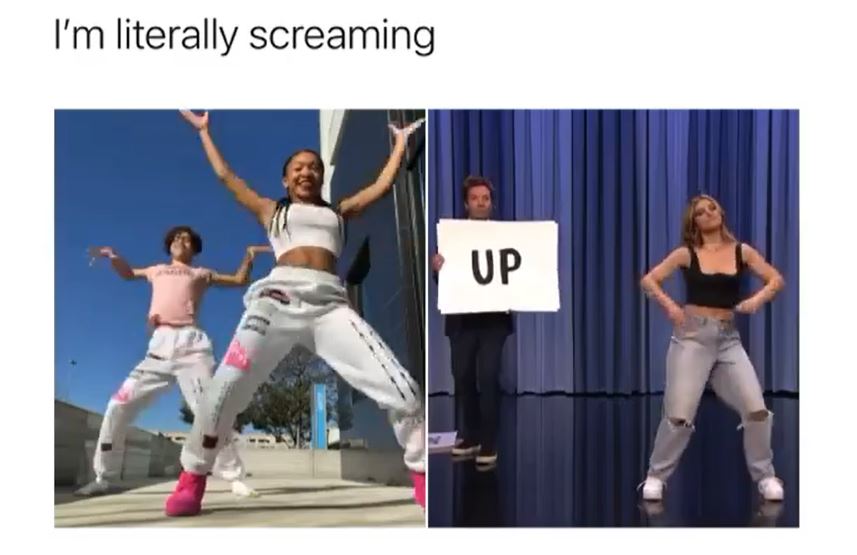
Memes such as this one began to circulate on social media, highlighting the original dance to “Up” by Chris and Mya Johnson alongside Addison Rae’s performance on “The Tonight Show Starring Jimmy Fallon.”
Didn’t we just have this conversation?
Of course, we did! In December 2019, Black Dubsmash users began to see their dances proliferate on TikTok, go viral, and lead to legitimate fame for the white teens who supposedly created these popular dance trends. In this case, D1 Nayah wanted credit for creating the viral “Donut Shop” dance to “Holy Moly” by Blueface and Jalaiah Harmon wanted credit for choreographing TikTok’s most famous dance—the Renegade dance challenge set to “Lottery (Renegade)” by K Camp. Both of these dances migrated to TikTok from other social media apps, notably Dubsmash, Funimate, and Instagram. On TikTok, Charli D’Amelio hit the challenges without giving dance credit and her followers incorrectly assumed that she had created the dances. After a digital activist wave largely led by Dubsmashers, the controversy boiled over in January 2020 when journalist Taylor Lorenz of the New York Times broke the story about Harmon aka “The Original Renegade.” Within a week, Harmon’s life radically changed from anonymity to a robust media circuit that saw the Georgia teen on nearly every major network, the Ellen DeGeneres Show, and as a featured performer at the NBA All-Star Game. To her credit, D’Amelio was responsive. She immediately began crediting dancers on her TikTok videos, using “dc” to indicate dance credit. As one of the app’s trendsetters, she sets the culture of TikTok. In this case, she modeled the practice and importance of giving dance credit for her followers to emulate.
Seeing this and being a Dubmsasher myself, I began (rage) writing Renegades: Digital Dance Cultures from Dubsmash to TikTok. Renegades explores the roles that Dubsmash, social media, and hip hop music and dance play in youth identity formation in the United States. This work often begins on Dubsmash before migrating to larger platforms such as TikTok. I analyze Dubsmash and TikTok cultures from 2018-2020, focusing on popular influencers such as D1 Nayah, Jalaiah Harmon, Brooklyn Queen, and Kayla Nicole Jones and how their cultural work has created a fervent sense of generational culture that begins on Dubsmash and extends far beyond social media itself.
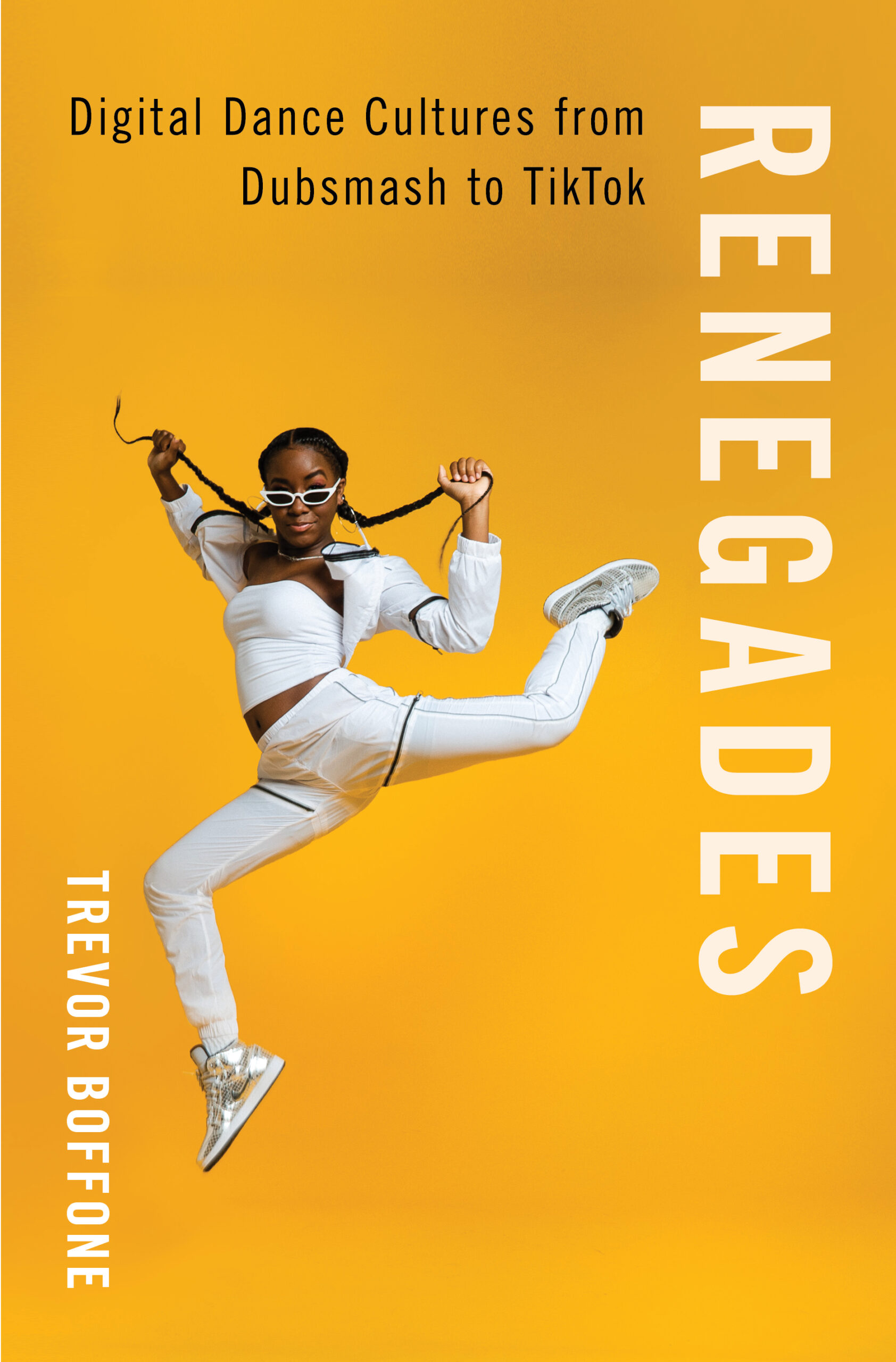
“Renegades: Digital Dance Cultures from Dubsmash to TikTok.” Pictured: Jalaiah Harmon. Photo courtesy Jalaiah Harmon; photo by Thiree Pinnock and Ty “Creed” Smith.
As I witnessed the robust conversations on social media around Jimmy Fallon, Addison Rae, and the issue of dance credit, I saw Renegade’s argument play out again and again… and again. My book should be dated by now, but here we were, having the exact same conversation that we had had a year ago.
The culture around dance credit supposedly changed. Or did it?
In the meantime, the United States was forced to face the ugly reality of centuries of racism. After the murders of Breonna Taylor, Ahmaud Arbery, and George Floyd, we collectively experienced a renewed Black Lives Matter Movement throughout 2020 and into the present. During this time, the blame was rightfully placed on white supremacy and the white institutions and individuals who collectively enable these systems of oppression to continue. Of course, there was white fragility and resistance, but there was also an outpouring of support from white people who seemed like they genuinely wanted to change. Copies of So You Want to Talk About Race by Ijeoma Oluo, and How to Be an Antiracist by Ibram X. Kendi, and White Fragility by Robin DiAngelo flew off shelves. Even so, as we have seen in recent months, copies of these books likely accumulated dust on the shelves rather than highlighted passages and post-it notes.
If we had truly embraced the Black Lives Matter movement then we would have begun working to undo systems of oppression that maintain white supremacy. Although many people will dismiss something like TikTok dance credit as inconsequential, it can be a game-changer for artists. Receiving credit can lead to followers, media exposure, a network of other social media influencers, promotions and endorsement deals, and more. Institutions such as The Tonight Show Starring Jimmy Fallon have a responsibility to credit artists, not simply on YouTube. If producers and staff at The Tonight Show had truly embraced conversations about racism and white privilege in 2020 then they would have understood how Addison Rae’s performance followed a lineage of white people profiting off the backs of Black artists. This was not lost of social media where users on Twitter, Instagram, and TikTok, for instance, drew attention to popular films like Bring It On and Dreamgirls that dramatize this phenomenon.
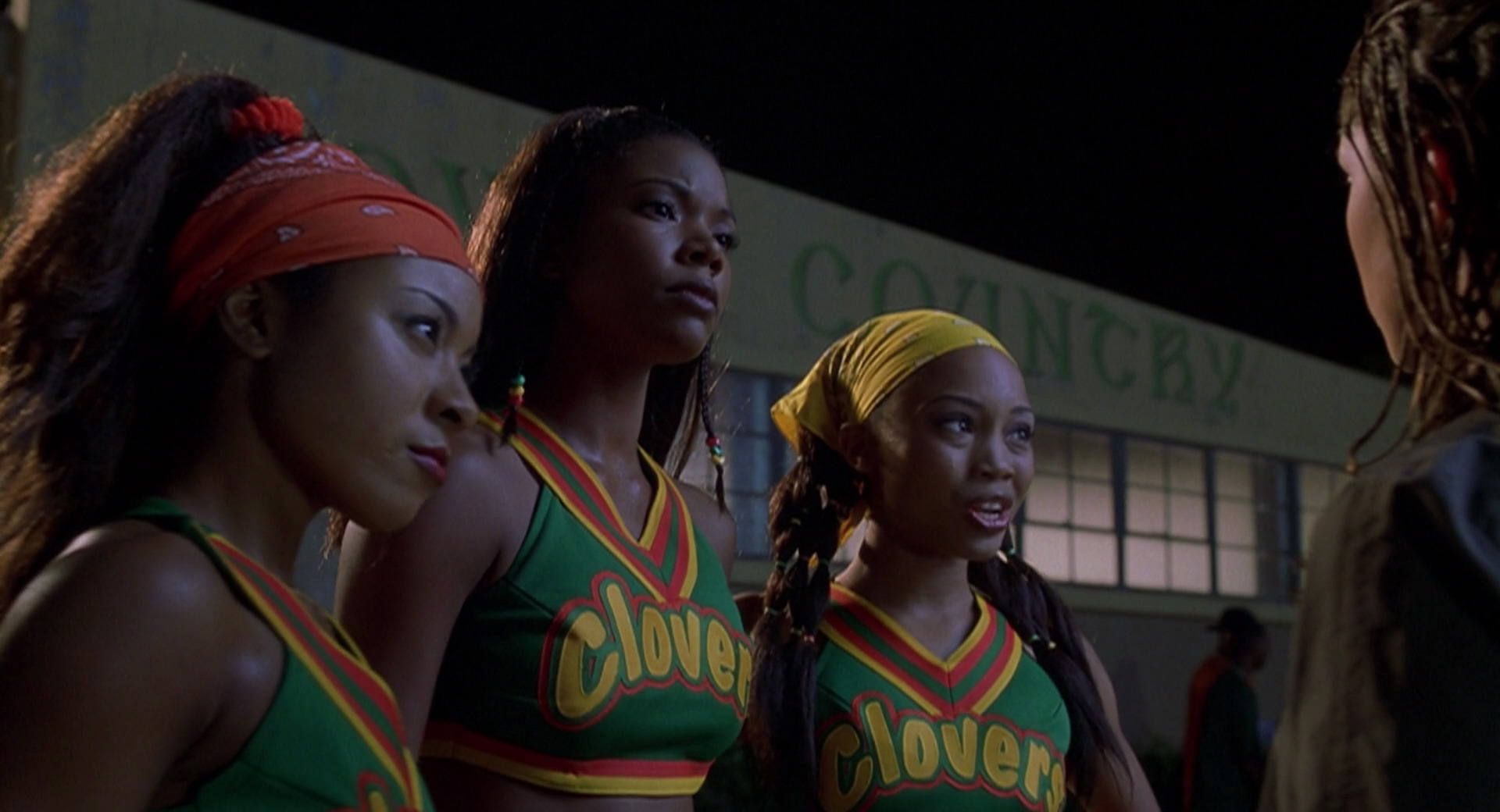
Members of the Compton Clovers cheer squad confront the Rancho Carne Toros about stealing their dance moves in a now-iconic scene from Bring It On.
If we have learned anything from the last year it’s that we must recognize the contributions of Black artists. We can no longer take the easy way out and just look at something like TikTok in a superficial way. Rather, we must understand that TikTok features the same complex systems of racial inequality that play out in the “real world.” Going forward, shows such as The Tonight Show, The Late Late Show with James Corden, The Ellen DeGeneres Show, and the like must be aware of the power they hold to change the culture around artist credit. Doing something as little as projecting the names of Black artists on the screen can be a huge step. But why stop there? Take it a step further and actually invite some of these artists on the show. That can be a game-changer and do significant work to move the needle.
Having a white teen perform watered-down versions of dances created by Black teens ain’t it. Do better.
****Full list of TikTok handles of each dance’s creator below:
Do It Again – dc: @noahschnapp
Savage Love – dc: @jazlynebaybee
Corvette Corvette – dc: @yvnggprince
Laffy Taffy – dc: @flyboyfu
Savage – dc: @keke.janajah
Blinding Lights – dc: @macdaddyz
Up – dc: @theemyanicole & @cchrvs
Fergalicious – dc: @thegilberttwins
This post was written by the author in their personal capacity.The opinions expressed in this article are the author’s own and do not reflect the view of The Theatre Times, their staff or collaborators.
This post was written by Trevor Boffone.
The views expressed here belong to the author and do not necessarily reflect our views and opinions.

